Case Study: MasterCard's Adaptation to New Environment in India
VerifiedAdded on 2022/12/27
|6
|1478
|84
Case Study
AI Summary
This case study examines MasterCard's strategic move to introduce contactless smartphone technology for small and medium enterprises (SMEs) in India. It analyzes the opportunities presented by a changing environment, particularly the rise of digital payments and the impact of demonetization. The study explores how MasterCard aims to protect itself from competitors through partnerships with banks and focuses on the long-term viability of its 'Tap & Go' technology, considering its product life cycle and market adoption. The analysis highlights the advantages of this technology, such as cost-effectiveness and ease of use, especially for small transactions. Furthermore, the case study delves into the growth stage of the 'Tap & Go' technology due to the increased use of digital transactions and the maturity stage of MasterCard's traditional business, providing a comprehensive understanding of the company's adaptation to the evolving financial landscape.
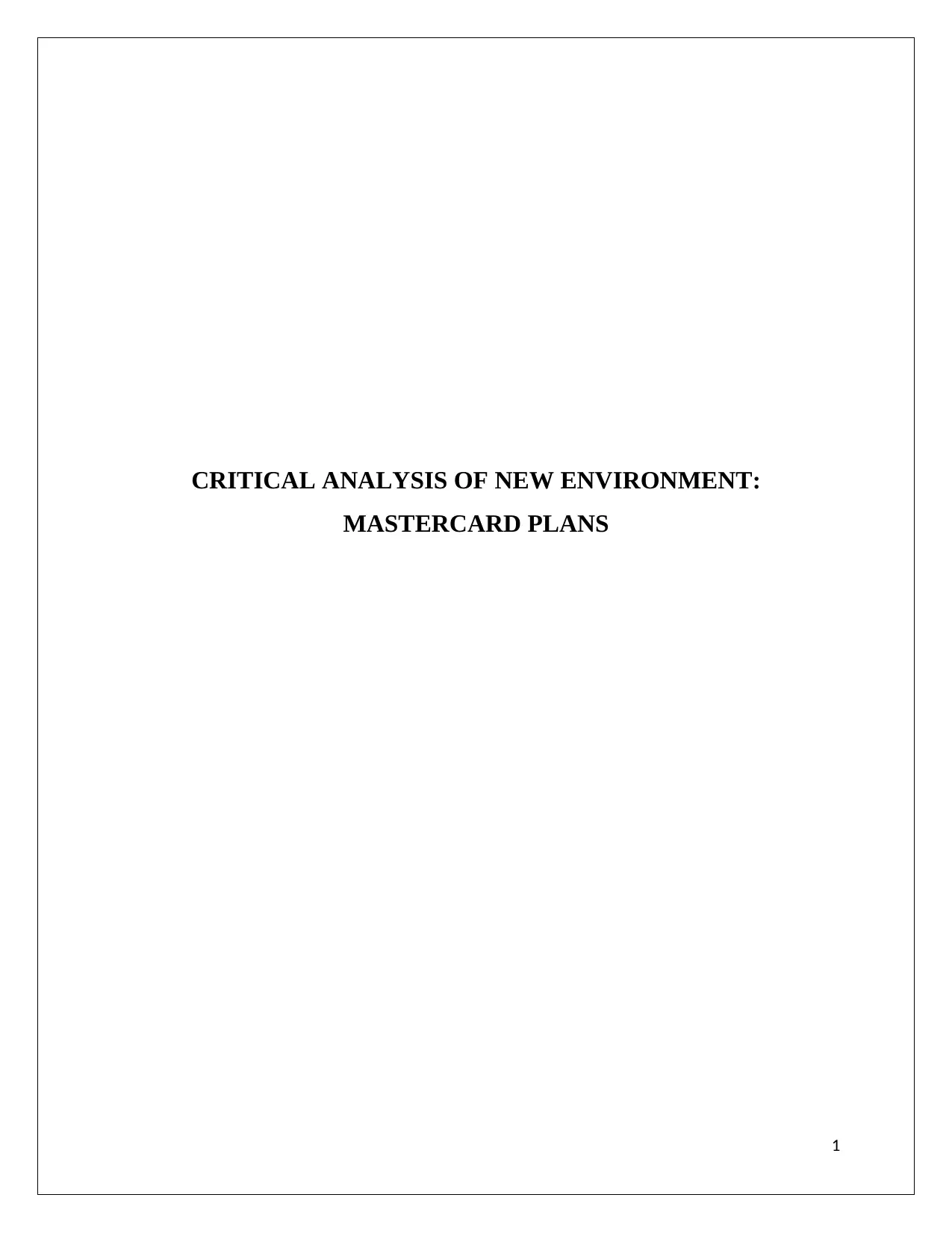
CRITICAL ANALYSIS OF NEW ENVIRONMENT:
MASTERCARD PLANS
1
MASTERCARD PLANS
1
Paraphrase This Document
Need a fresh take? Get an instant paraphrase of this document with our AI Paraphraser
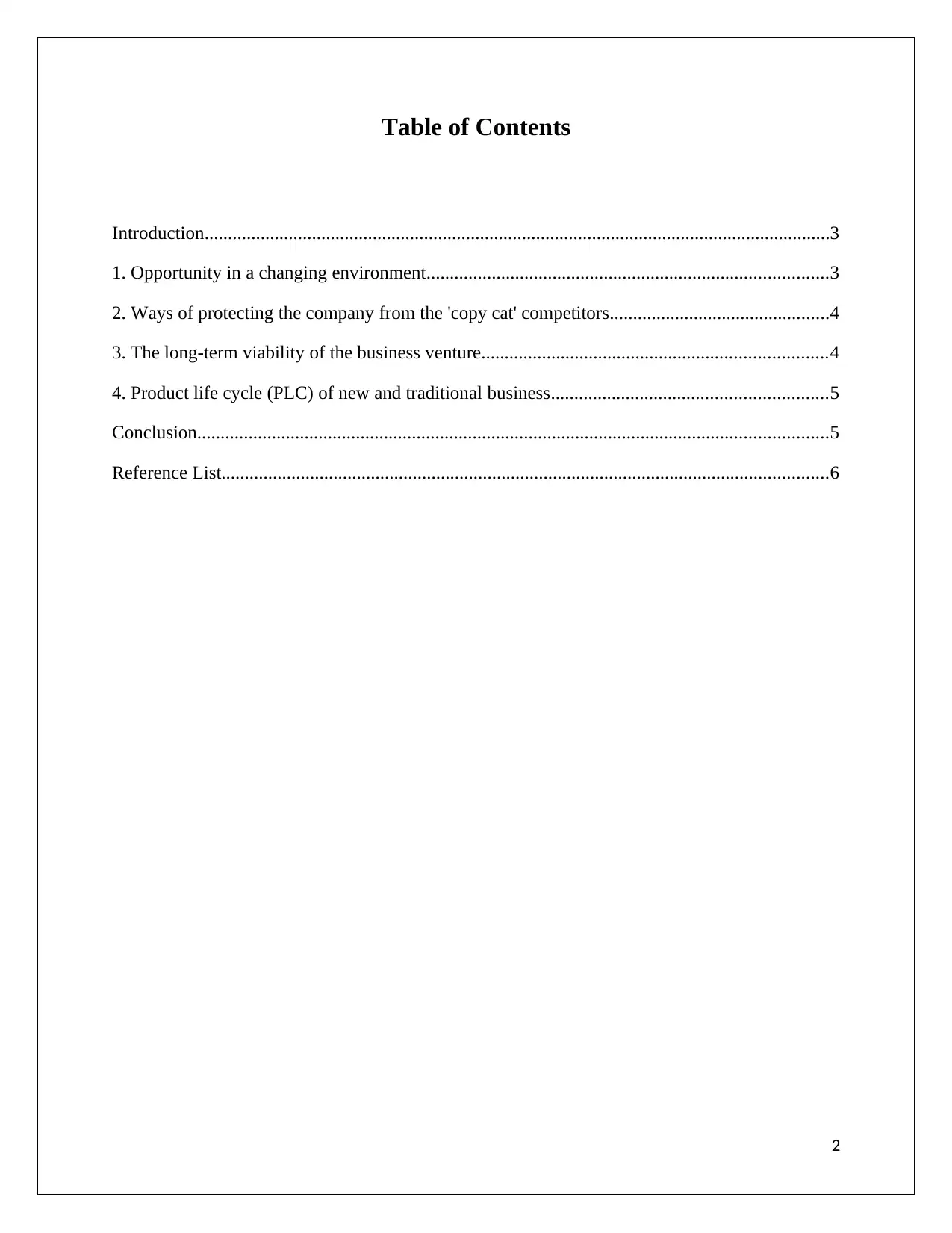
Table of Contents
Introduction......................................................................................................................................3
1. Opportunity in a changing environment......................................................................................3
2. Ways of protecting the company from the 'copy cat' competitors...............................................4
3. The long-term viability of the business venture..........................................................................4
4. Product life cycle (PLC) of new and traditional business...........................................................5
Conclusion.......................................................................................................................................5
Reference List..................................................................................................................................6
2
Introduction......................................................................................................................................3
1. Opportunity in a changing environment......................................................................................3
2. Ways of protecting the company from the 'copy cat' competitors...............................................4
3. The long-term viability of the business venture..........................................................................4
4. Product life cycle (PLC) of new and traditional business...........................................................5
Conclusion.......................................................................................................................................5
Reference List..................................................................................................................................6
2
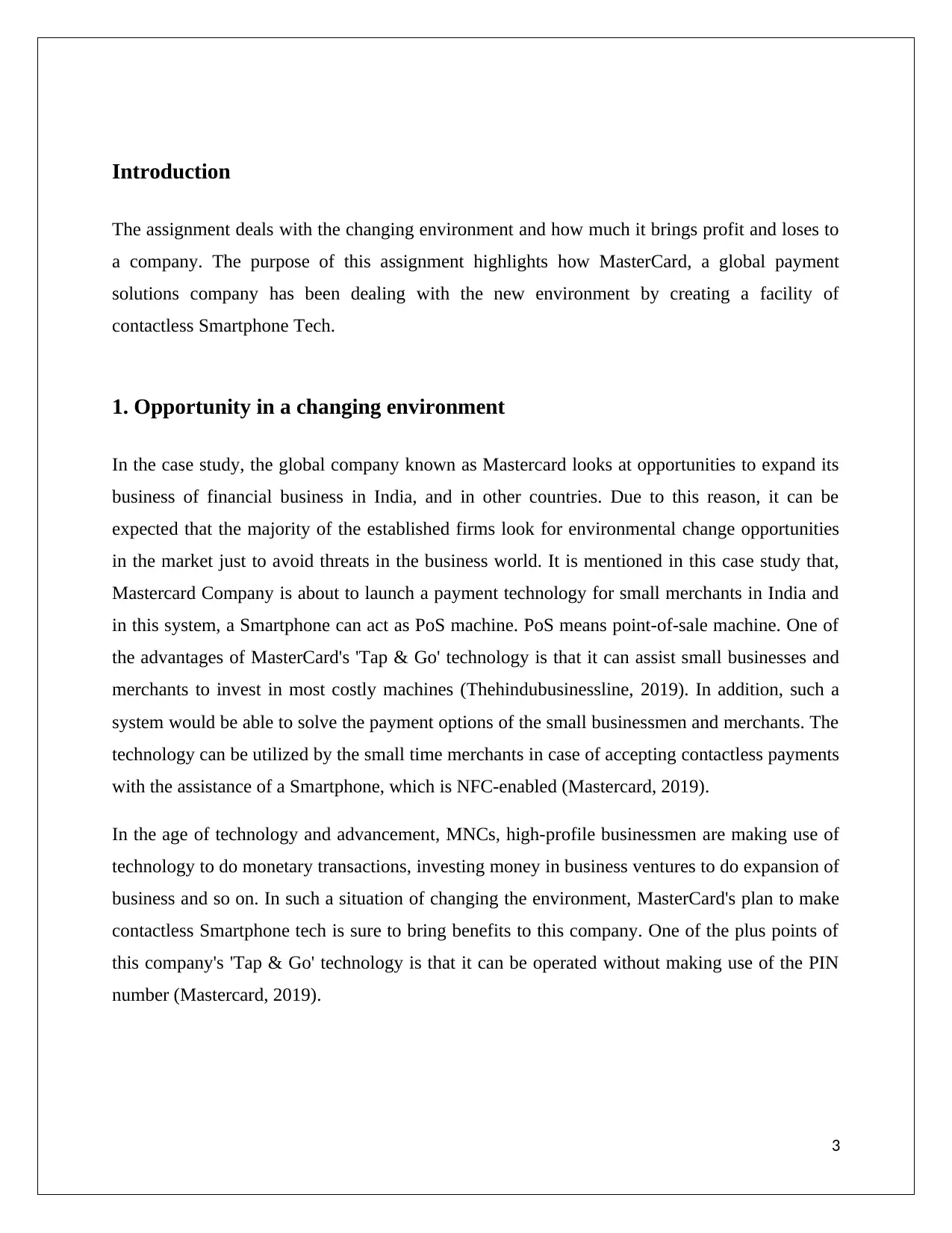
Introduction
The assignment deals with the changing environment and how much it brings profit and loses to
a company. The purpose of this assignment highlights how MasterCard, a global payment
solutions company has been dealing with the new environment by creating a facility of
contactless Smartphone Tech.
1. Opportunity in a changing environment
In the case study, the global company known as Mastercard looks at opportunities to expand its
business of financial business in India, and in other countries. Due to this reason, it can be
expected that the majority of the established firms look for environmental change opportunities
in the market just to avoid threats in the business world. It is mentioned in this case study that,
Mastercard Company is about to launch a payment technology for small merchants in India and
in this system, a Smartphone can act as PoS machine. PoS means point-of-sale machine. One of
the advantages of MasterCard's 'Tap & Go' technology is that it can assist small businesses and
merchants to invest in most costly machines (Thehindubusinessline, 2019). In addition, such a
system would be able to solve the payment options of the small businessmen and merchants. The
technology can be utilized by the small time merchants in case of accepting contactless payments
with the assistance of a Smartphone, which is NFC-enabled (Mastercard, 2019).
In the age of technology and advancement, MNCs, high-profile businessmen are making use of
technology to do monetary transactions, investing money in business ventures to do expansion of
business and so on. In such a situation of changing the environment, MasterCard's plan to make
contactless Smartphone tech is sure to bring benefits to this company. One of the plus points of
this company's 'Tap & Go' technology is that it can be operated without making use of the PIN
number (Mastercard, 2019).
3
The assignment deals with the changing environment and how much it brings profit and loses to
a company. The purpose of this assignment highlights how MasterCard, a global payment
solutions company has been dealing with the new environment by creating a facility of
contactless Smartphone Tech.
1. Opportunity in a changing environment
In the case study, the global company known as Mastercard looks at opportunities to expand its
business of financial business in India, and in other countries. Due to this reason, it can be
expected that the majority of the established firms look for environmental change opportunities
in the market just to avoid threats in the business world. It is mentioned in this case study that,
Mastercard Company is about to launch a payment technology for small merchants in India and
in this system, a Smartphone can act as PoS machine. PoS means point-of-sale machine. One of
the advantages of MasterCard's 'Tap & Go' technology is that it can assist small businesses and
merchants to invest in most costly machines (Thehindubusinessline, 2019). In addition, such a
system would be able to solve the payment options of the small businessmen and merchants. The
technology can be utilized by the small time merchants in case of accepting contactless payments
with the assistance of a Smartphone, which is NFC-enabled (Mastercard, 2019).
In the age of technology and advancement, MNCs, high-profile businessmen are making use of
technology to do monetary transactions, investing money in business ventures to do expansion of
business and so on. In such a situation of changing the environment, MasterCard's plan to make
contactless Smartphone tech is sure to bring benefits to this company. One of the plus points of
this company's 'Tap & Go' technology is that it can be operated without making use of the PIN
number (Mastercard, 2019).
3
⊘ This is a preview!⊘
Do you want full access?
Subscribe today to unlock all pages.

Trusted by 1+ million students worldwide
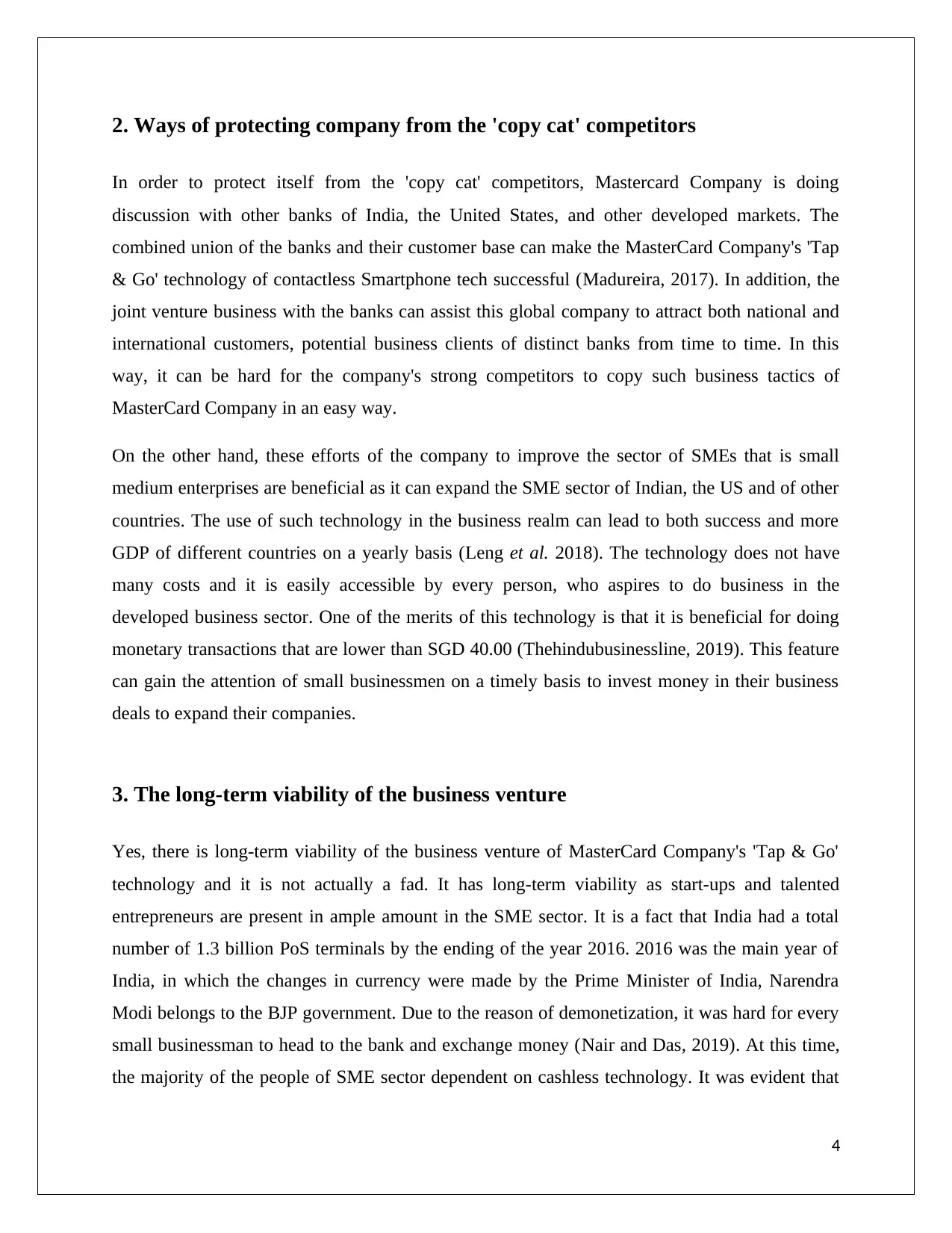
2. Ways of protecting company from the 'copy cat' competitors
In order to protect itself from the 'copy cat' competitors, Mastercard Company is doing
discussion with other banks of India, the United States, and other developed markets. The
combined union of the banks and their customer base can make the MasterCard Company's 'Tap
& Go' technology of contactless Smartphone tech successful (Madureira, 2017). In addition, the
joint venture business with the banks can assist this global company to attract both national and
international customers, potential business clients of distinct banks from time to time. In this
way, it can be hard for the company's strong competitors to copy such business tactics of
MasterCard Company in an easy way.
On the other hand, these efforts of the company to improve the sector of SMEs that is small
medium enterprises are beneficial as it can expand the SME sector of Indian, the US and of other
countries. The use of such technology in the business realm can lead to both success and more
GDP of different countries on a yearly basis (Leng et al. 2018). The technology does not have
many costs and it is easily accessible by every person, who aspires to do business in the
developed business sector. One of the merits of this technology is that it is beneficial for doing
monetary transactions that are lower than SGD 40.00 (Thehindubusinessline, 2019). This feature
can gain the attention of small businessmen on a timely basis to invest money in their business
deals to expand their companies.
3. The long-term viability of the business venture
Yes, there is long-term viability of the business venture of MasterCard Company's 'Tap & Go'
technology and it is not actually a fad. It has long-term viability as start-ups and talented
entrepreneurs are present in ample amount in the SME sector. It is a fact that India had a total
number of 1.3 billion PoS terminals by the ending of the year 2016. 2016 was the main year of
India, in which the changes in currency were made by the Prime Minister of India, Narendra
Modi belongs to the BJP government. Due to the reason of demonetization, it was hard for every
small businessman to head to the bank and exchange money (Nair and Das, 2019). At this time,
the majority of the people of SME sector dependent on cashless technology. It was evident that
4
In order to protect itself from the 'copy cat' competitors, Mastercard Company is doing
discussion with other banks of India, the United States, and other developed markets. The
combined union of the banks and their customer base can make the MasterCard Company's 'Tap
& Go' technology of contactless Smartphone tech successful (Madureira, 2017). In addition, the
joint venture business with the banks can assist this global company to attract both national and
international customers, potential business clients of distinct banks from time to time. In this
way, it can be hard for the company's strong competitors to copy such business tactics of
MasterCard Company in an easy way.
On the other hand, these efforts of the company to improve the sector of SMEs that is small
medium enterprises are beneficial as it can expand the SME sector of Indian, the US and of other
countries. The use of such technology in the business realm can lead to both success and more
GDP of different countries on a yearly basis (Leng et al. 2018). The technology does not have
many costs and it is easily accessible by every person, who aspires to do business in the
developed business sector. One of the merits of this technology is that it is beneficial for doing
monetary transactions that are lower than SGD 40.00 (Thehindubusinessline, 2019). This feature
can gain the attention of small businessmen on a timely basis to invest money in their business
deals to expand their companies.
3. The long-term viability of the business venture
Yes, there is long-term viability of the business venture of MasterCard Company's 'Tap & Go'
technology and it is not actually a fad. It has long-term viability as start-ups and talented
entrepreneurs are present in ample amount in the SME sector. It is a fact that India had a total
number of 1.3 billion PoS terminals by the ending of the year 2016. 2016 was the main year of
India, in which the changes in currency were made by the Prime Minister of India, Narendra
Modi belongs to the BJP government. Due to the reason of demonetization, it was hard for every
small businessman to head to the bank and exchange money (Nair and Das, 2019). At this time,
the majority of the people of SME sector dependent on cashless technology. It was evident that
4
Paraphrase This Document
Need a fresh take? Get an instant paraphrase of this document with our AI Paraphraser
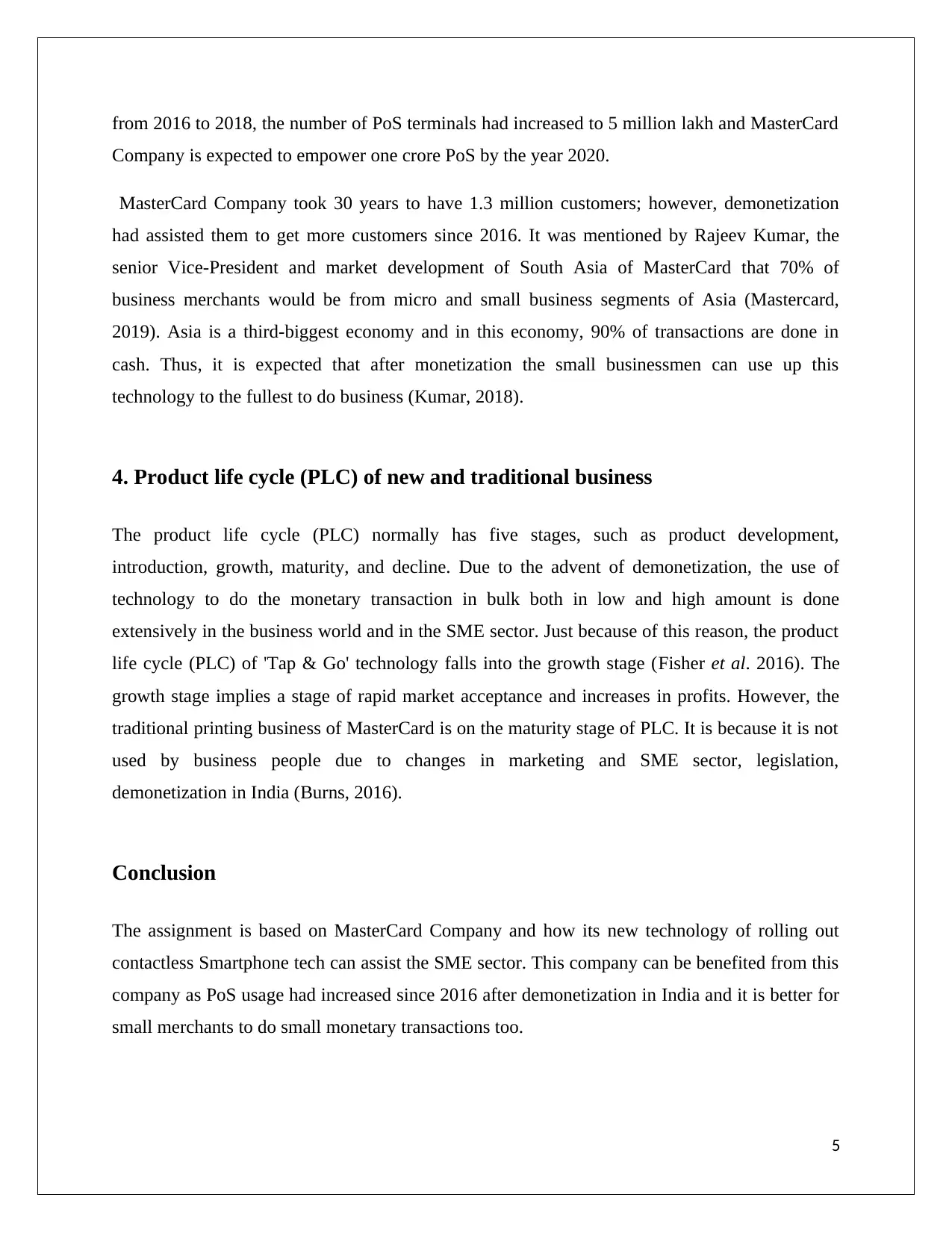
from 2016 to 2018, the number of PoS terminals had increased to 5 million lakh and MasterCard
Company is expected to empower one crore PoS by the year 2020.
MasterCard Company took 30 years to have 1.3 million customers; however, demonetization
had assisted them to get more customers since 2016. It was mentioned by Rajeev Kumar, the
senior Vice-President and market development of South Asia of MasterCard that 70% of
business merchants would be from micro and small business segments of Asia (Mastercard,
2019). Asia is a third-biggest economy and in this economy, 90% of transactions are done in
cash. Thus, it is expected that after monetization the small businessmen can use up this
technology to the fullest to do business (Kumar, 2018).
4. Product life cycle (PLC) of new and traditional business
The product life cycle (PLC) normally has five stages, such as product development,
introduction, growth, maturity, and decline. Due to the advent of demonetization, the use of
technology to do the monetary transaction in bulk both in low and high amount is done
extensively in the business world and in the SME sector. Just because of this reason, the product
life cycle (PLC) of 'Tap & Go' technology falls into the growth stage (Fisher et al. 2016). The
growth stage implies a stage of rapid market acceptance and increases in profits. However, the
traditional printing business of MasterCard is on the maturity stage of PLC. It is because it is not
used by business people due to changes in marketing and SME sector, legislation,
demonetization in India (Burns, 2016).
Conclusion
The assignment is based on MasterCard Company and how its new technology of rolling out
contactless Smartphone tech can assist the SME sector. This company can be benefited from this
company as PoS usage had increased since 2016 after demonetization in India and it is better for
small merchants to do small monetary transactions too.
5
Company is expected to empower one crore PoS by the year 2020.
MasterCard Company took 30 years to have 1.3 million customers; however, demonetization
had assisted them to get more customers since 2016. It was mentioned by Rajeev Kumar, the
senior Vice-President and market development of South Asia of MasterCard that 70% of
business merchants would be from micro and small business segments of Asia (Mastercard,
2019). Asia is a third-biggest economy and in this economy, 90% of transactions are done in
cash. Thus, it is expected that after monetization the small businessmen can use up this
technology to the fullest to do business (Kumar, 2018).
4. Product life cycle (PLC) of new and traditional business
The product life cycle (PLC) normally has five stages, such as product development,
introduction, growth, maturity, and decline. Due to the advent of demonetization, the use of
technology to do the monetary transaction in bulk both in low and high amount is done
extensively in the business world and in the SME sector. Just because of this reason, the product
life cycle (PLC) of 'Tap & Go' technology falls into the growth stage (Fisher et al. 2016). The
growth stage implies a stage of rapid market acceptance and increases in profits. However, the
traditional printing business of MasterCard is on the maturity stage of PLC. It is because it is not
used by business people due to changes in marketing and SME sector, legislation,
demonetization in India (Burns, 2016).
Conclusion
The assignment is based on MasterCard Company and how its new technology of rolling out
contactless Smartphone tech can assist the SME sector. This company can be benefited from this
company as PoS usage had increased since 2016 after demonetization in India and it is better for
small merchants to do small monetary transactions too.
5
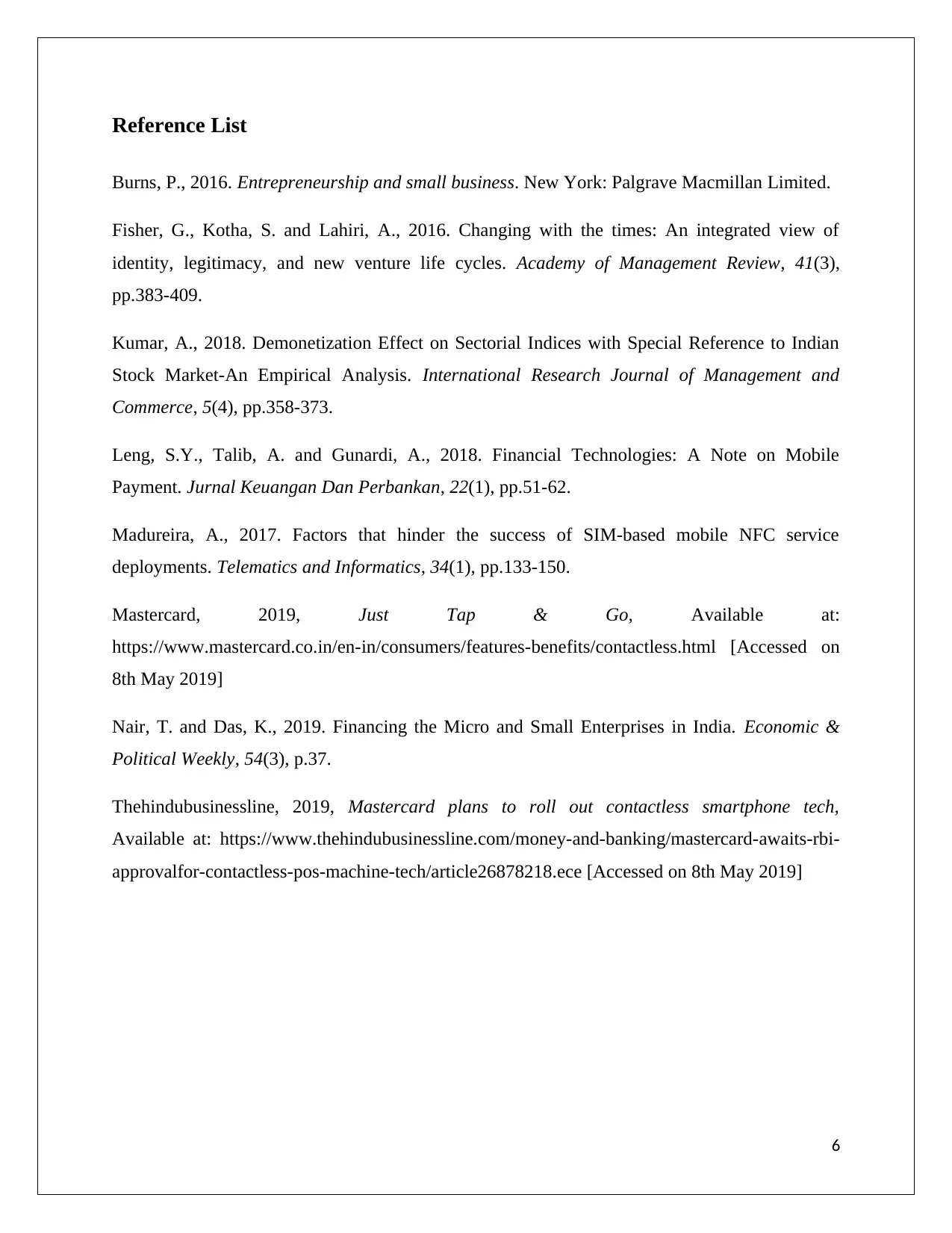
Reference List
Burns, P., 2016. Entrepreneurship and small business. New York: Palgrave Macmillan Limited.
Fisher, G., Kotha, S. and Lahiri, A., 2016. Changing with the times: An integrated view of
identity, legitimacy, and new venture life cycles. Academy of Management Review, 41(3),
pp.383-409.
Kumar, A., 2018. Demonetization Effect on Sectorial Indices with Special Reference to Indian
Stock Market-An Empirical Analysis. International Research Journal of Management and
Commerce, 5(4), pp.358-373.
Leng, S.Y., Talib, A. and Gunardi, A., 2018. Financial Technologies: A Note on Mobile
Payment. Jurnal Keuangan Dan Perbankan, 22(1), pp.51-62.
Madureira, A., 2017. Factors that hinder the success of SIM-based mobile NFC service
deployments. Telematics and Informatics, 34(1), pp.133-150.
Mastercard, 2019, Just Tap & Go, Available at:
https://www.mastercard.co.in/en-in/consumers/features-benefits/contactless.html [Accessed on
8th May 2019]
Nair, T. and Das, K., 2019. Financing the Micro and Small Enterprises in India. Economic &
Political Weekly, 54(3), p.37.
Thehindubusinessline, 2019, Mastercard plans to roll out contactless smartphone tech,
Available at: https://www.thehindubusinessline.com/money-and-banking/mastercard-awaits-rbi-
approvalfor-contactless-pos-machine-tech/article26878218.ece [Accessed on 8th May 2019]
6
Burns, P., 2016. Entrepreneurship and small business. New York: Palgrave Macmillan Limited.
Fisher, G., Kotha, S. and Lahiri, A., 2016. Changing with the times: An integrated view of
identity, legitimacy, and new venture life cycles. Academy of Management Review, 41(3),
pp.383-409.
Kumar, A., 2018. Demonetization Effect on Sectorial Indices with Special Reference to Indian
Stock Market-An Empirical Analysis. International Research Journal of Management and
Commerce, 5(4), pp.358-373.
Leng, S.Y., Talib, A. and Gunardi, A., 2018. Financial Technologies: A Note on Mobile
Payment. Jurnal Keuangan Dan Perbankan, 22(1), pp.51-62.
Madureira, A., 2017. Factors that hinder the success of SIM-based mobile NFC service
deployments. Telematics and Informatics, 34(1), pp.133-150.
Mastercard, 2019, Just Tap & Go, Available at:
https://www.mastercard.co.in/en-in/consumers/features-benefits/contactless.html [Accessed on
8th May 2019]
Nair, T. and Das, K., 2019. Financing the Micro and Small Enterprises in India. Economic &
Political Weekly, 54(3), p.37.
Thehindubusinessline, 2019, Mastercard plans to roll out contactless smartphone tech,
Available at: https://www.thehindubusinessline.com/money-and-banking/mastercard-awaits-rbi-
approvalfor-contactless-pos-machine-tech/article26878218.ece [Accessed on 8th May 2019]
6
⊘ This is a preview!⊘
Do you want full access?
Subscribe today to unlock all pages.

Trusted by 1+ million students worldwide
1 out of 6
Your All-in-One AI-Powered Toolkit for Academic Success.
+13062052269
info@desklib.com
Available 24*7 on WhatsApp / Email
![[object Object]](/_next/static/media/star-bottom.7253800d.svg)
Unlock your academic potential
Copyright © 2020–2026 A2Z Services. All Rights Reserved. Developed and managed by ZUCOL.

